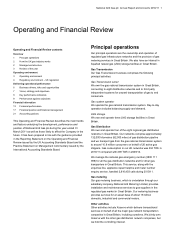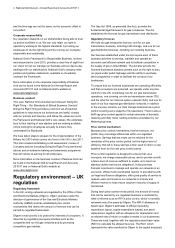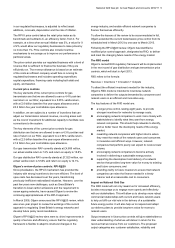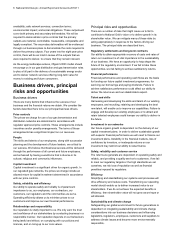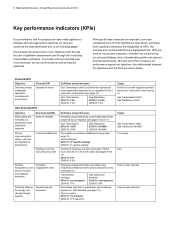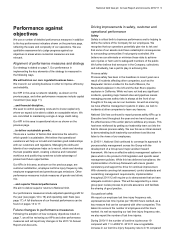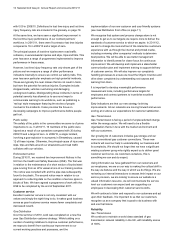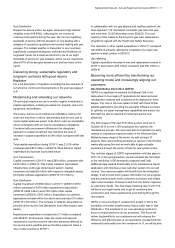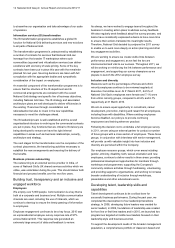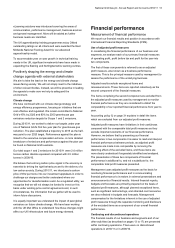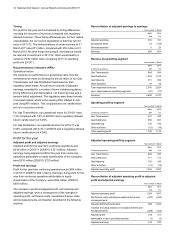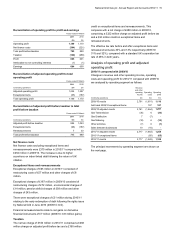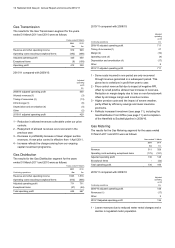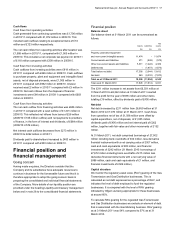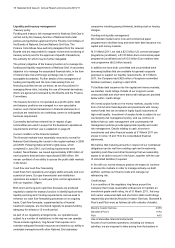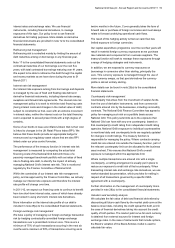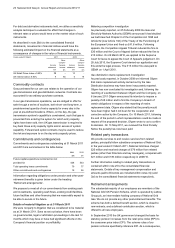National Grid 2011 Annual Report Download - page 12
Download and view the complete annual report
Please find page 12 of the 2011 National Grid annual report below. You can navigate through the pages in the report by either clicking on the pages listed below, or by using the keyword search tool below to find specific information within the annual report.10 National Grid Gas plc Annual Report and Accounts 2010/11
with 0.09 in 2009/10. Definitions for lost time injury and lost time
injury frequency rate are included in the glossary on page 79.
At the same time, we have seen a significant improvement in
the lost time injury performance of our contract partners’
workforce. In 2010/11, there were 9 contractor lost time injuries
compared to 16 in 2009/10 and a target of zero.
The principal causes of lost time injuries were road traffic
collisions, musculoskeletal injuries and slips, trips and falls. This
year has seen a range of programmes implemented to improve
performance in these areas.
However, lost time injury frequency rate only shows part of the
picture and we measure a range of other performance
indicators internally to ensure we control our safety risks. This
year has seen particular emphasis on high potential incidents.
These are typically the near misses that do not result in harm,
but have the potential for serious injuries. Examples include:
dropped loads, vehicles overturning and damaging
underground cables. Distinguishing these incidents in terms of
potential severity has allowed us to use novel ways to
communicate learning to its workforce, such as publishing a
‘red top’ style newspaper featuring the stories of people
involved in the incidents. It also provides the focus on
developing campaigns to improve performance before people
get hurt.
Public safety
The safety of the public in the communities we serve is of prime
importance to us. In 2010/11, 16 members of the public were
injured as a result of our operations compared with 30 during
2009/10 and a target of zero. In 2009/10, a single incident,
involving a gas explosion in a property in Shrewsbury, caused
12 of these injuries. Otherwise, the principal cause of injury was
slips, trips and falls around our streetworks and road traffic
collisions with our vehicles.
Enforcement action
During 2010/11, we received two Improvement Notices in the
UK from the Health and Safety Executive (HSE). The first was
in relation to the maintenance of a short section of buried steel
pipe running from an LPG vessel at one of our training centres.
The notice was complied with and the pipe was subsequently
found to be plastic. The second notice was in relation to our
approach to collecting data on the condition of service pipes in
blocks of flats. We have agreed a programme of work with the
HSE to be completed by the end of September 2011.
Customer service
Excellent customer service is not only consistent with our
values and simply the right thing to do, it makes good business
sense as good customer service means fewer complaints and
decreased rework.
Gas Distribution
Over the summer of 2010, work was completed on a new five
year Gas Distribution customer strategy. While building on a
number of existing initiatives to improve customer performance,
we expect to benefit from continuous improvement to our
current working practices and processes, and the
implementation of our new customer and user friendly systems
(see Gas Distribution front office on page 11).
We recognise that system and process change alone is not
enough to get us to our targets; we require more to deliver the
standards of customer service to which we aspire. In 2011/12,
we aim to change the look and feel of the interaction customers
experience with us through the internet and printed media,
including reviewing other companies’ methods to determine
best practice. We will be able to use better management
information to identify areas for closer focus for continuous
improvement. We will develop and implement a stakeholder
communication plan and implement training to support delivery
of customer service. We will also improve our complaints
handling processes to ensure we meet the Ofgem incentive and
drive down complaints by understanding root causes and
learning from them.
It is important to develop meaningful performance
measurement tools, including performance targets for
employees and contract partners to incentivise excellent
performance.
Early indications are that our new strategy is driving
improvements. All our networks are moving forward and we are
scoring at or above our expectations for customer satisfaction.
Gas Transmission
Gas Transmission is facing a period of unprecedented change
within the energy sector. We will need to be a flexible
organisation that is in tune with the market environment and
with our customers.
Our growing list of customers includes gas storage and our
more conventional gas customer connections. These new
entrants will need our help in understanding our business and
its complexity. We should not forget that we have a significant
existing customer group who rightly expect us to deliver great
customer service too. As customers ourselves, this is
something we can and do expect.
Using information we have gathered from our customers and
our employees, we are on our way to making the cultural shift in
the way we behave and the way in which we do things. We are
reviewing our internal interactions to assess their impact on our
service provision, we are looking to ensure our website is a
valued information resource, we will communicate the service
level our customers can expect and are supporting our
employees in developing their customer service skills.
We will continue to listen and respond to our customers and act
upon their feedback. It is important to us that our customers
recognise us as a company that is good to do business with
and one that listens.
Reliability
Gas Transmission
We continue to maintain a world class standard of gas
transmission network reliability in the UK, with reliability scores
of 100%.



